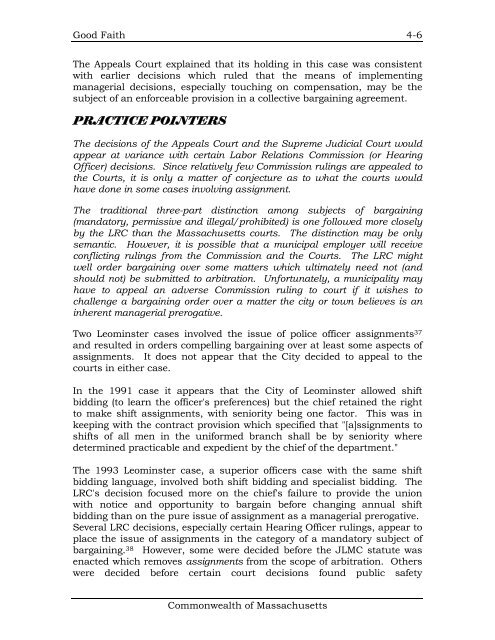Management Rights - AELE's Home Page
Management Rights - AELE's Home Page
Management Rights - AELE's Home Page
Create successful ePaper yourself
Turn your PDF publications into a flip-book with our unique Google optimized e-Paper software.
Good Faith 4-6<br />
The Appeals Court explained that its holding in this case was consistent<br />
with earlier decisions which ruled that the means of implementing<br />
managerial decisions, especially touching on compensation, may be the<br />
subject of an enforceable provision in a collective bargaining agreement.<br />
PRACTICE POINTERS<br />
The decisions of the Appeals Court and the Supreme Judicial Court would<br />
appear at variance with certain Labor Relations Commission (or Hearing<br />
Officer) decisions. Since relatively few Commission rulings are appealed to<br />
the Courts, it is only a matter of conjecture as to what the courts would<br />
have done in some cases involving assignment.<br />
The traditional three-part distinction among subjects of bargaining<br />
(mandatory, permissive and illegal/prohibited) is one followed more closely<br />
by the LRC than the Massachusetts courts. The distinction may be only<br />
semantic. However, it is possible that a municipal employer will receive<br />
conflicting rulings from the Commission and the Courts. The LRC might<br />
well order bargaining over some matters which ultimately need not (and<br />
should not) be submitted to arbitration. Unfortunately, a municipality may<br />
have to appeal an adverse Commission ruling to court if it wishes to<br />
challenge a bargaining order over a matter the city or town believes is an<br />
inherent managerial prerogative.<br />
Two Leominster cases involved the issue of police officer assignments 37<br />
and resulted in orders compelling bargaining over at least some aspects of<br />
assignments. It does not appear that the City decided to appeal to the<br />
courts in either case.<br />
In the 1991 case it appears that the City of Leominster allowed shift<br />
bidding (to learn the officer's preferences) but the chief retained the right<br />
to make shift assignments, with seniority being one factor. This was in<br />
keeping with the contract provision which specified that "[a]ssignments to<br />
shifts of all men in the uniformed branch shall be by seniority where<br />
determined practicable and expedient by the chief of the department."<br />
The 1993 Leominster case, a superior officers case with the same shift<br />
bidding language, involved both shift bidding and specialist bidding. The<br />
LRC's decision focused more on the chief's failure to provide the union<br />
with notice and opportunity to bargain before changing annual shift<br />
bidding than on the pure issue of assignment as a managerial prerogative.<br />
Several LRC decisions, especially certain Hearing Officer rulings, appear to<br />
place the issue of assignments in the category of a mandatory subject of<br />
bargaining. 38 However, some were decided before the JLMC statute was<br />
enacted which removes assignments from the scope of arbitration. Others<br />
were decided before certain court decisions found public safety<br />
Commonwealth of Massachusetts
















